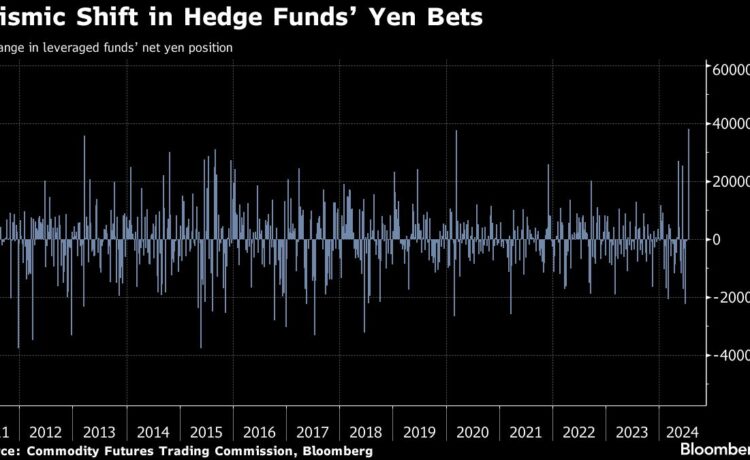(Bloomberg) — Hedge funds pared bets against the yen in spectacular fashion after a suspected double-whammy market intervention from Japanese authorities to bolster the currency.
Most Read from Bloomberg
Leveraged funds reduced net short positions on the yen by 38,025 contracts during the week to July 16th — the most since March 2011, Commodity Futures Trading Commission data showed.
While they’re still bearish to the tune of a net 76,588 contracts, the shift coincides with an improvement in sentiment for the yen, which has last week rebounded to the highest level versus the dollar since early June. Hedge funds pulled back during what was a turbulent trading week, with Japan estimated to have spent ¥5.64 trillion ($35.8 billion) over two sessions to lift the yen from near its weakest levels since the 1980s.
“There’s not much demand left for yen selling after a series of Japanese interventions,” said Yukio Ishizuki, a senior currency market strategist at Daiwa Securities Co. in Tokyo. “It seems the trend of closing short yen positions will become predominant” heading into the BOJ’s policy decision on July 31, he said.
The yen’s recent advance also reflects support from firming wagers of a Federal Reserve interest rate cut in September, and comments from Donald Trump that were critical of yen weakness.
The next big test for traders is due at the end of the month, when both the Fed and the Bank of Japan will deliver policy decisions. Any hint of dovishness by the BOJ will likely be seized on as a reason to resume shorting the yen.
Asset managers also pared their short yen positions by the most in a year, CFTC data showed.
The yen was trading little changed at 157.57 versus the dollar at 11:21 a.m. in Tokyo.
With Japan’s consumer prices accelerating for a second month in June, the case is growing stronger for policymakers to raise rates once more. Around one in three BOJ watchers expects a hike in borrowing costs on July 31, according to a Bloomberg survey last month.
“We expect the BOJ to lift rates in July, which may add some much-needed sustainability” in the yen, Krishna Bhimavarapu, APAC economist at State Street Global Advisors, wrote in a note.
–With assistance from Saburo Funabiki.
Most Read from Bloomberg Businessweek
©2024 Bloomberg L.P.















